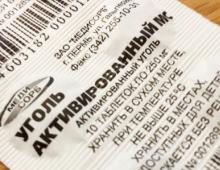Find out information about a WWII participant. How to find information about those who participated in the Great Patriotic War. Winners: Soldiers of the Great War
— visual documents of the information found;
— links where you can find and read information about your grandfather;
— address of the archive of the Ministry of Defense of the Russian Federation (TsAMO RF);
- where he fought and in what rank, unit number,
- wounds, where he was buried, awards, when he retired;
— supplemented with links to archives for regions of Russia;
The Great Patriotic War affected every family.
And if you still don’t know the story about your grandfather or great-grandfather/grandmother who fought,
don't be lazy to do it now and pass it on to your children.
Just a couple of weeks ago I came across several Internet resources where I found information about my great-grandfather and grandfather.
One died in 1942 near Smolensk.
The second came home with wounds and awards, but he himself hardly spoke about the terrible events of that terrible war.
Great Patriotic War - 1941-1945
obd-memorial.ru/ - a generalized data bank contains information about defenders
Fatherland, dead and missing during the Great Patriotic War and the post-war period.
pamyat-naroda.ru/ - war heroes, burials, military operations
podvignaroda.ru / - electronic bank of awards documents
For those who want to feel part of a huge whole. After all, the history of every family is fraught with an incredible number of secrets and discoveries, troubles and joys, happy and tragic stories that will make you feel that you have an incredible legacy behind you. And you don’t have to be a distant relative of princes and counts to feel like part of history.
The opportunity to find out who your predecessors were is an invaluable wealth that cannot be measured in material units.
Some people want to understand who their great-grandmother was, some want to find the trace of a relative who disappeared decades ago, and others want to find out where the remains of their grandfather who died in the Great Patriotic War are buried.
The goals are different, but they have one thing in common - the desire to find answers to exciting questions about the origins of their family in the mists of time. In any case, the research process can turn into a real adventure and be remembered for many years.
Where to start research of this kind
First, ask the oldest family members about relatives living in other places. What do they remember about their parents, brothers and sisters, when they were born and what their names were, where they lived and where they moved?
Perhaps someone knows the burial places or the house in which your great-great-grandfather was born is still preserved. Any information would be valuable. Even what songs they sang in the village when they had a wedding, what clothes they wore and what they ate, how they liked to spend their time and what animals they kept in the house. Perhaps this information will not help us find out our ancestry up to the seventh generation, but it will definitely bring distant times closer to us and help us understand people who lived decades ago. Don’t forget to record the conversation on a voice recorder so that later you can transcribe the recording and transfer it to paper. Plus, the living voice of a loved one will definitely stay with you, and important details will not slip out of your memory.
How to find information about your ancestors in the archives

Before heading to the state archives, start by clearing out your home shelving.
Pay attention to photographs, documents on marriage or divorce, birth and death certificates, documents on graduation. At the same time, look not only at the front, but also at the back of the document or photograph. Important notes may remain on it that will help in further searches.
This is especially true for photographs: many people signed the names of the people depicted, as well as the date and place where the photo was taken. And in the photograph itself you can see the name of the station or find out in what rank your great-grandfather ended the war.
How to find the history of your ancestors: ways to systematize information
It's easy to get confused when searching through multiple sources and pieces of information. Therefore, we advise you to write down all incoming data in a notepad or create a folder on your computer.
How to find your family of ancestors by first and last name: on the Internet and in the archive
It is logical that those who seek to find information about their roots try to find their relatives by searching by last name. On the Internet you can find many sites dedicated to research by experts in the field of family history. Perhaps you, too, will be lucky to find a clue that will lead to the traces of your ancestors.
There are special reference books and dictionaries where you can find a brief history of your surname. Usually, it dates back to ancient times, and is often formed from the nickname, name, profession, nationality, noticeable character traits or appearance, as well as the place of residence of your distant ancestor.
Thus, the surname Goncharov was built on the principle of “son of a potter - potters.” The surnames of representatives of princely families usually came from the name of the lands where the family's possessions were located. Vyazemsky and Meshchersky are direct examples of this.
Think about how your last name was formed; perhaps it will say a lot about your relatives.
How can you find the roots of your ancestors via the Internet: looking for information about relatives on the Internet

A simple Google search with the first and last name of your relative is unlikely to yield any significant results. You should rather turn to specialized search engines:
- Google Books will help you find scans of thousands of books and reference books. Hundreds of digitized publications from pre-Soviet times cannot be found by ordinary search engines. And with the help of this site, you can simply enter your last name and first name into the search bar and accidentally stumble upon a mention of relatives.
- MyHeritage.com is an international service that will allow you to search through countless archival lists, metric records, audit tales, and burial lists. The site is paid, but there are also options for which you do not need to pay. With its help, you can both find your ancestors and model an approximate layout of your own family tree based on data about their pedigree.
- OBD "Memorial". Almost a starting service for those who know very little about their roots and are trying to understand how to find their family by surname. “Memorial” is a service that helps to obtain information about missing, killed or captured soldiers during the Great Patriotic War. For almost all military personnel, the place of birth and year are written. This makes the search much easier. If you know that your great-great-grandfather died in the war, but what village he was from and where to look for information about him you don’t know, this resource can become a real treasure trove of information. Often the lists indicate not only the name of the soldier and his place of birth, but also the names of his family members who were informed of the death of the soldier. This is not only a name, but also a note about who the person who died is related to. This way you will not only find out the place of birth of your relative, but also the names of his mother, father or wife. This service is also useful for owners of rare surnames. Through a search, you can see the distribution area and find out where its carriers were born and lived. Quite often it turns out that almost all namesakes lived in the same area or even in one small village.
- An important help in how to find information about ancestors on the Internet will be the website of the All-Russian Family Tree. There you can find a whole database and an excellent forum of participants who share their stories of searching for roots, and can also give valuable advice and suggest in which direction to “dig” next.
- You can search more specifically and precisely. If you want to find out about the fate of your relative who died during the First or Second World War, we advise you to turn to the resources “In Memory of the Heroes of the Great War of 1914–1918” and “Memory of the People.” If you are looking for information about a relative who may have been repressed, pay attention to the websites “Everyone’s Personal File” and the “Last Address” project.

- You can view the personal files of relatives who died in the Holocaust on the website of the Yad Vashem center.
- For those who know that their ancestors lived in Moscow or St. Petersburg in Soviet or pre-revolutionary times, the address directories “All Moscow” and “All Petersburg” will be an invaluable assistant. Here you can find information about your relative's address, and sometimes about his occupation. These reference books can be viewed on the Historical Library website.
- Something similar to the previous point - Memorable books. Such collections were published in the pre-Soviet period every year in almost every province. They wrote about all the people who held any minor position in the province. Starting from a village doctor or land surveyor to the chairman of the noble assembly. Almost all publications have indexes. You can search for memorial books on the website of the same “Historical Library”.
- A somewhat specific, but also extremely useful resource for those who are interested in how to find the biography of their ancestors is the website familysearch.org. It is a collection of documents prepared by American Mormons. You can search digitized documents from all over the world, including Russia and Ukraine. However, non-Mormons are not allowed to view the data. You can obtain permission if you make an official request to the resource administration.
How else can you find information about the biography of your ancestors?

To search for living relatives or descendants of those who have already died, write to the website of the “Wait for Me” program. You can not only send a request to search for a specific person, but also monitor whether lost relatives and friends are looking for you or your loved ones.
You can contact the registry office. Provided that you have your own birth certificate (if not, order it there), you can receive documents from deceased relatives. Using this method, you can find out where your grandmother was born or where your grandfather got married. However, this only works for documents released after the October Revolution. Papers from the pre-Soviet period need to be looked for elsewhere.
How to find data about your ancestors in the archives

Since the 18th century, population censuses have been conducted in our country. The oldest of them are in the archives and help restore the genealogy to the time of Peter I. Many centuries ago, the most important documents: birth and death certificates, marriage certificates were issued in two copies, one of which was kept in the church, and the second in a special storage facility.
It is better to look for cases related to noble families in the Russian State Historical Archive in St. Petersburg.
Also located in the city on the Neva is the Russian State Archive of the Navy - here you can find information about relatives who lived in pre-Soviet times, as well as those who were born and lived after the revolution.
The Russian State Archive of Ancient Acts is based in the capital - here you can find documents from the Time of Troubles and an earlier period. The Russian State Military Historical Archive is also located in Moscow. Here it is better to look for information on time before 1918.
In the Moscow region there is the city of Podolsk, which houses the Central Archive of the Ministry of Defense - here it is possible to find information for the period from the beginning of the Second World War to the present.
You can do the research yourself, but be prepared to face painstaking paperwork and numerous hours spent in archives. Those who, for some reason, cannot spend so much time, but still want to get information about their roots, should turn to the help of professionals. “Russian House of Genealogy” will help you conduct research that will show where, how and when your ancestors lived, loved and died. Our specialists have access to closed archives. They will not only help you create a search strategy, but will also conduct archival and search work, check the authenticity of the data and systematize the information received into a family tree. You can order the design of a genealogy book and family coat of arms, which will clearly present the rich history of your family.
Not everyone returned from the front in 1945; the ancestors of many of us are still on the lists of missing persons. But we continue to look for those who gave their lives for us and gave us clear skies above our heads.
Memorial
Thanks to the document, you can find out when and where the WWII participant died, as well as the primary burial place and the place of reburial (if there is one).
Memory of the People
If your relative is listed as missing, you can search for information about his fate in the database of Soviet prisoners of war by Nazi Germany.

What I was able to find: by searching on Google “Myshbor station war” I was able to find information that Mikhail Vasilyevich Batukhtin fell in battle with German bombers on August 16, 1942 near the Myshbor railway station. From report No. 24967 on irretrievable losses dated September 22, 1942, we learn that 8 soldiers were killed during the bombing. All of them, including my great-grandfather, were buried here. Unfortunately, the mass grave could not be found on the Internet.
Maria Batukhtina
Only by knowing the history of your family can you be a full member of society. It is important to remember and honor the memory of grandfathers and great-grandfathers who defended their Motherland at the cost of their lives. However, it often happens that information about a deceased or missing relative is not preserved in the memory of descendants. In this case, you can try to restore the information by referring to archival documents.
Search for a grandfather who participated in the Second World War
With the development of digital technologies, the search for a grandfather who died in the war can be carried out independently, using specialized Internet resources. To do this, just enter a query in the Internet search engine, for example: “search for Grandfather of the Great Patriotic War.” If you had several front-line soldiers in your family, and you would like to know who fought where, in which sectors of the front they served, or in which military operations they participated, you can expand your request. In this case, you need to enter a query with the following content: “where did my grandfather fight, search by last name for free” or, for example: “where did my grandfather fight, search by last name.”

- The most informative and reliable are archival sites created with the support of the Ministry of Defense of the Russian Federation, or created by the Russian Historical Society. If you are wondering: “Where did my grandfather fight?” – the search should begin by viewing the resource generalized database "Memorial". This site contains information about Soviet soldiers who died or went missing during the fighting or in the post-war period. You can find a war hero by name, year of birth and rank;
- You can find information about the awards that your relative received during the war using the electronic services database of award lists called “Feat of the People”. This database is interesting because it contains scanned original documents - awards orders and accompanying documents. Be sure to save these documents on your computer, print them, if possible, show these documents to your relatives - everyone should know about the heroism of their ancestors!;
- If during the war one of your relatives was captured by the Nazis, was taken to German territory, or his traces were lost in the occupied territories, a search in German database of Ostarbeiters and prisoners of war .
Personally, I found it on the site "Feat of the people" information about my grandfather (I post a picture below) and great-grandfather. It was very nice to read about their exploits. It’s interesting that even my dad and his sister didn’t really know why my grandfather received the medal “For Courage” in 1943 - he didn’t like to talk about the war at all. On the site "Memorial" I found information about my grandfather’s two missing brothers and another great-grandfather who died in the war in February 1945. Eternal memory to my glorious ancestors!
This is what information about a soldier looks like on the website: "Feat of the people"(this is my grandfather's card):
And this is the site "Memorial" and a card of my great-grandfather, who disappeared:
Do you have information about your grandparents who defended their homeland? during the war? Tell us in the comments below the article about how you found out who fought where, and what you feel when you remember your heroic ancestors?
Watch the most complete surviving video recording of that same Victory Parade, which passed through the streets of our capital in the memorable May 1945.



